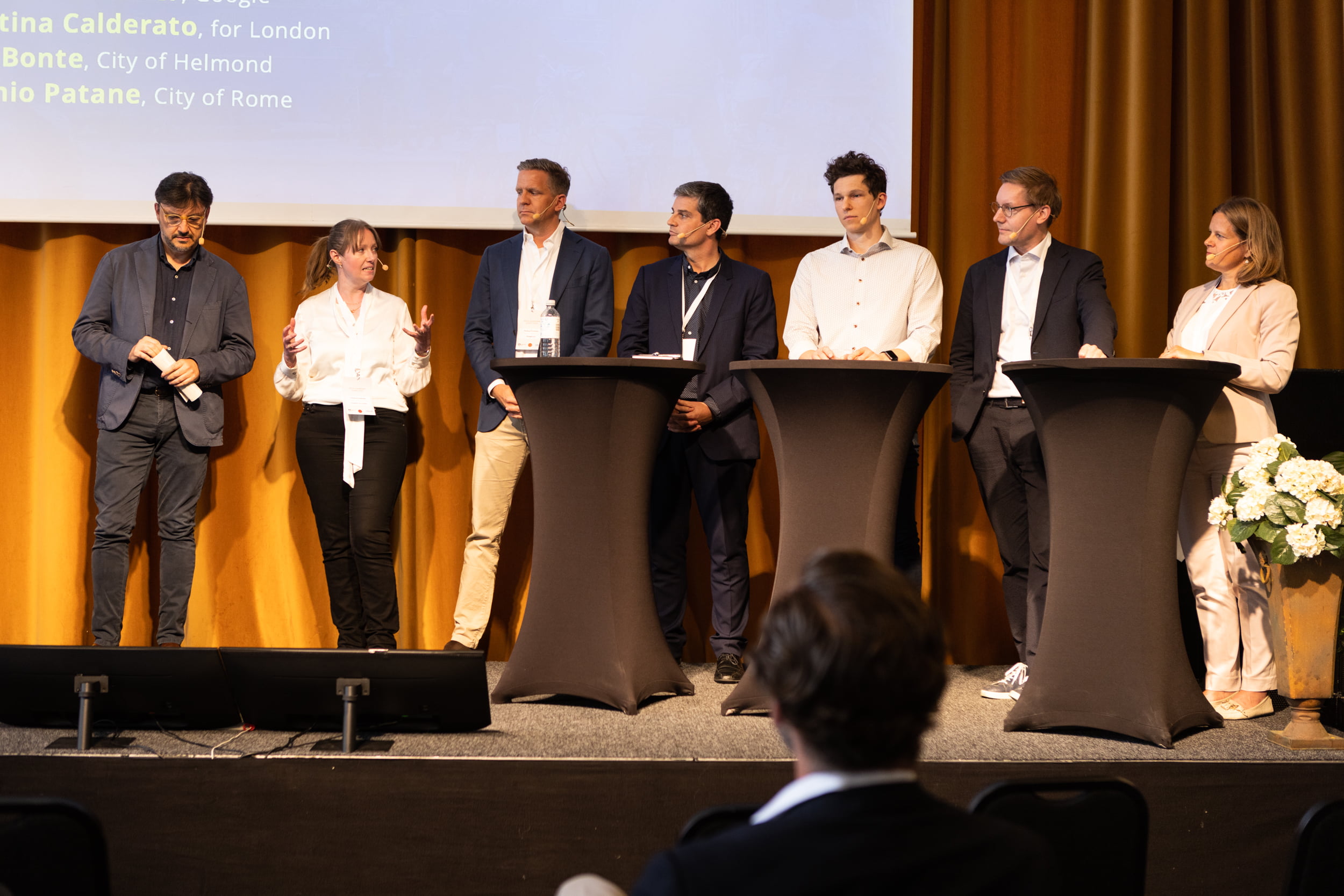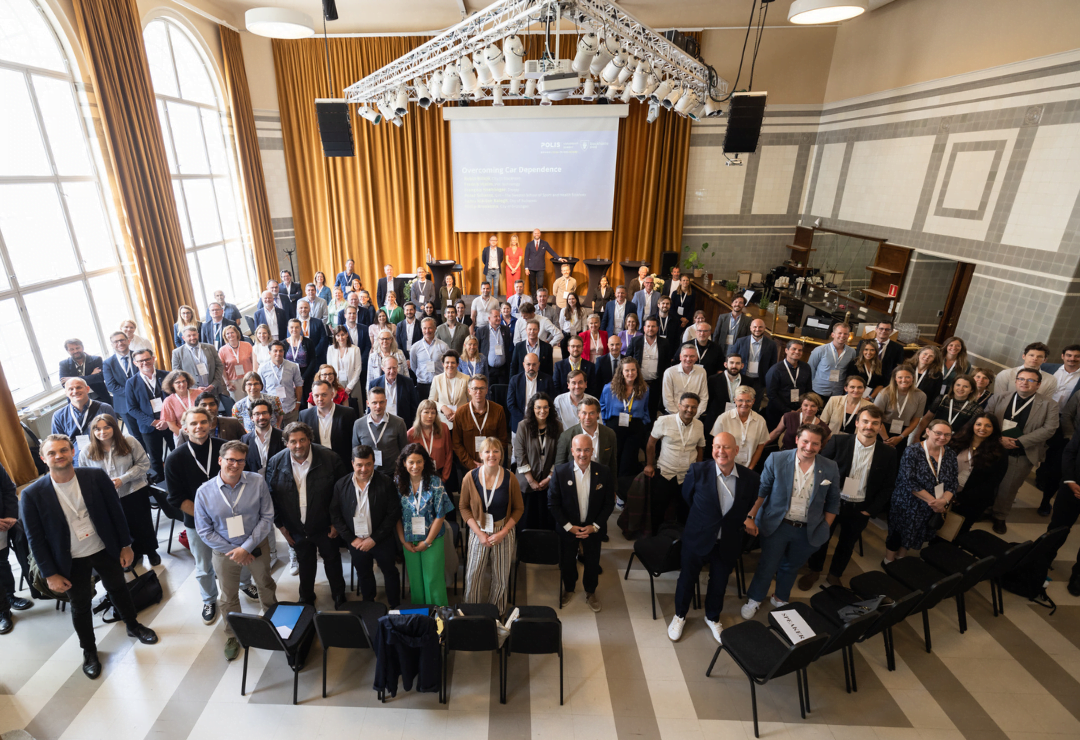Leadership in Action, Now!
The decisions urban mobility leaders make — and do not make — today will determine the trajectory of life for every citizen. A cleaner, more equitable future is theirs for the taking, should they choose to act. POLIS’ Leadership Summit in Stockholm brought together high-level transport decision-makers to talk tough about the future of sustainable transport, and how we pull together to cut carbon emissions while placing liveability and justice at the heart of action.
Cities and regions are on the frontline of climate action. Each week brings further warnings of the impending crisis, and the future our cities face if sustainability agendas are not radically expanded and accelerated.
Change is not simply cutting carbon, congestion is costly to local businesses and negatively impacts the urban quality of life, road safety remains a critical concern, and existing fuel sources present genuine security and health threats. The liveability of our cities hinges on transport transfiguration.

Attendees of POLIS' Leadership Summit in Stockholm. Credit: Angela Zander
There is no denying the scale of the challenge ahead; success demands strong leadership and steadfast cooperation across the mobility sphere. Bringing together a diverse coalition of high-level mobility decision-makers is precisely what POLIS’ recent Leadership Summit, held on 8 June in Stockholm, sought to vitalise.
From Budapest to Pisa, Groningen to Glasgow, the European Cyclist Federation to the OECD, The European Commission to Google; local leaders, NGOs, operators, new mobility providers, think tanks and international policymakers met for a frank, honest and — most of all — collaborative exchange on the road (track, and bike lane) towards sustainable urban mobility.
The importance of leadership
The latest IPCC Report is clear: action is 'now or never', and not taking it will make many European cities uninhabitable. 'Politicians and industry leaders alike, should not be afraid to take bold steps: together we must continue to push in the right direction,' said Karen Vancluysen, Secretary General, POLIS.
Mobility is central to the environmental agenda, yet, when it comes to transport’s transformation, major international climate summits have displayed a disappointing lack of ambition and action — what UN Secretary-General António Guterres, has publicly lambasted as a 'damning indictment of failed climate leadership'. Amidst this lethargy, it is now our cities and regions who are taking up the mantle. Across Europe, local leaders are taking unprecedented steps to transform their urban mobility systems, shunning combustion engines, reallocating space, and providing cleaner, more accessible transport services.
From Leuven to London, Groningen to Glasgow — the list goes on; transport decision-makers are reconfiguring and redefining mobility. Indeed, head down to Ljubljana’s Prešeren Square, Lisbon’s Baixa, or Glasgow’s Buchanan Street, and you will find hordes of cyclists and walkers on pedestrianised routes, where cars once ruled the roads.
Public-private collaborations: are we all singing from the same hymn sheet?
However, it is not just the public sector reshaping urban mobility. As new technologies and mobility services emerge, data and digital products are transforming transit, and new players come onto the scene, reaching across the public-private divide is more urgent than ever, moving in the right direction, together.

Public and private sector leaders take to the stage. Credit: Angela Zander
The last several months have revealed that cities, operators and citizens are not always on the same page- or even reading the same book. Upscaling electromobility, overcoming car dependence and placing a just transition front and centre require all stakeholders to pull in the same direction. 'We are at the stage when we- everybody in this room- need to work together and understand our different approaches and priorities,' noted François Hoehlinger, Deputy CEO, Troopy.
The Summit in Stockholm was a chance to renew these ties and establish new ones. 'It is the collaboration between policymakers, industry experts, technology providers, business and individuals that will let us make critical progress and impact,' urged Michael Firnhaber, Consumer Maps Partnerships, Google. 'Companies and cities need to work to explain the implications of consumer behaviour on the climate and steer more sustainable decisions,' echoed Fernando Liesa, Secretary General, Alliance for Logistics Innovation through Collaboration in Europe (ALICE).
Upscaling electromobility
The last decade has seen unparalleled advances in electrification. The array of electric private passenger vehicles, bus fleets, bikes, as well as charging solutions, was almost unimaginable even a decade ago. 'There are visible developments that present an opportunity such as smart charging to make smarter use of the energy network, and the integration of these into wider urban development,' said Monique Esselbrugge, Deputy Mayor for Mobility, City of Eindhoven — a city which has invested heavily in alternative fuels and innovative transport technologies.

Jill Warren (CEO, European Cyclist Foundation) speaking at the Summit. Credit: Angela Zander
There is no denying that electrification is changing the game and is instrumental in decarbonisation agendas.
This year, for the first time ever, Europe saw sales of e-buses outstrip diesel buses, while battery capacity continues to improve. Nonetheless, a clear and honest conversation about its role in the future of urban mobility is critical in understanding the potential, pitfalls, and the full lifecycle of electric vehicles, while ensuring electromobility does not cater for the wealthy urban elite.
Delegates in Stockholm were united in their calls for better infrastructure to support electrification, for public transport, shared fleets, urban freight, and passenger vehicles alike. 'We need to be aware of our blind spots,' said Antoine Grange, Chief Executive Officer Europe, Transdev. 'There remain concerns and shortfall in grid capacity, storage and green electricity generation, we need further innovation and technology to support territories in their energy transition.'
While many conversations around electrification focus on vehicles, we cannot overlook the role it plays in supporting active travel too — where e-bikes and e-cargo bikes are encouraging new — and often older and less mobile — individuals to take to the saddle, while also extending the range of cycling.
Cities are at a pivotal moment to capitalise on this momentum. 'If cities want to promote e-bikes it is important to invest in good-quality bike infrastructure and safe bike parking,' agreed Tony Grimaldi, President of Cycling Industries Europe and CEO of Cycleurope.
Overcoming car dependence
Electrification is only one piece of the puzzle. A climate-neutral and smart city is one where the car is no longer king.
Currently, in many European cities, way over half of ground transport space is dedicated to cars. As Stockholm’s mobility strategy articulates, it is about moving towards a city with cars — not a city for cars. 'As climate change has forced a reassessment of priorities, so has the demand for a more sustainable Stockholm. The debate about green mobility has increasingly raised the question of what kind of urban life we should be striving for,' said Lars Strömgren, Vice Mayor for Transport and Urban Environment, Stockholm.

Alexander Ståhle at the Summit. Credit: Angela Zander
Cities are widely touted as the ultimate symbol of human ingenuity. Terms such as 'smart', 'innovative', and 'efficient' dominate the urban mobility lexicon; yet, considering the impacts of carbon emissions on our climate, time squandered sitting in traffic, and lives lost to unsafe roads and fatal fumes, how 'intelligent' really is our current car dependency?
'How did we end up here?' asked Alexander Ståhle, CEO, Spacescape. 'When parking frequently occupies more room than residential space. This is not what people want. Think about it, in any city, look at the images or renders we use to show future urban design, they do not have any cars in them!'
There appears to be no shortage of arguments for dethroning the private car, however, implementing the policy and infrastructural changes required is taking time, time we do not have.
This is not to overlook the changes which are being pioneered; school streets, Low Emissions Zones (LEZs) and new public transit lines are being inaugurated across Europe. Nonetheless, these shifts are proving a thorny issue for many local leaders, who, without the support of citizens, local businesses, and national leaders, find their capacity for action restricted. 'All change will face resistance, as cars have been the symbol of freedom for so long, it will take time to change this,' said Fredrik Hjelm, CEO of Voi, a shared micromobility operator.
Engaging with concerns is undoubtedly essential. Policymakers who champion such street space reallocation — cannot sweep under the carpet the backlash faced by many decision-makers in cities. These battles are often driven by confusion around how such shifts will affect users, and overcoming this demands clear conversations about the future of mobility, the impacts of changes in transport services, and whom they are designed to serve. Without addressing this head-on, we risk hampering, even reversing, positive shifts towards more liveable, less car-dependent cities.
Indeed, Stockholm is learning from this, and intensive dialogue is currently underway with residents, businesses and property owners amidst the city’s preparations for one of the world’s most ambitious environmental zones, and it is paying off. 'So far, the response has been positive, especially among business owners. Many local companies see a big competitive advantage in being early in the green transition,' reported Strömgren.
Moving forward means changing the narrative, and how liveability and choice are framed and conveyed. 'We need to ask the right questions. NOT: where do you want to park your car? INSTEAD: what do you want your street to look like?' asserted Phillip Broeksma, Vice-mayor of Groningen — a city which pioneered a new traffic circulation plan already over 40 years ago.
Climate justice needs transport justice
Behind all this, a cleaner future for urban mobility must cater for all transport users. The concept of a Just Transition has rapidly gained ground over the last years, ensuring equity is placed front and centre of decarbonisation agendas, but social inequality in cities across Europe is growing at unprecedented rates, with little sign of abating. There are also alarming increases in urban-rural divisions, with rising poverty rates in many peri-urban and rural areas.

The Just Transition panel. Credit: Angela Zander
Transport has a lot to answer for here. Education, employment, healthcare: transport facilitates and impedes access to vital services and opportunities, traditional car-centric transport systems, reflect, replicate, and aggravate existing social inequalities — something the pandemic exposed with ongoing reverberations, as public transit cuts have left many without affordable or accessible options.
Without addressing transport justice, we will not achieve the critical mass of modal shift required for climate neutrality. 'We must move beyond reactive policy-making or mere adjustments based on past behavioural patterns, and embrace a more holistic perspective' emphasised Aimée Aguilar Jaber, Programme Lead for System's Thinking and Transformative Change for Netzero and Resilience, OECD.
Existing road networks, public transport and active travel options cater for the middle-income, male, able-bodied user, squeezing out anybody who does not fit into this category. A Just Transition is not about serving a fringe minority of 'vulnerable users', but huge swathes of the population. Low-income communities, women, and disabled travellers are frequently the least likely to use private cars — let alone electric models. 'A social check in what we are doing is always needed: those who are contributing the least to our climate problems, are suffering the most' warned David Dessers, Deputy Mayor for Mobility, Leuven.
Dialogue is necessary, but we need to stop running down the clock
The status quo is not working for anyone, least of all, mobility leaders themselves. It is therefore now time to step up to the plate. Dialogue is important, but time is not on our side, and actions speak louder. However, responsibility is not squarely on the shoulders of our cities and regions, the entire mobility sector will have a role to play in advancing the transport transition.
Will we be remembered as the generation who were too timid to act, or the one who put our differences aside and faced the challenge head-on?
Click here to read the article in its original format.
About the contributors:
Isobel Duxfield is Communications and Membership Manager at POLIS. She completed her MPhil in Gender Studies at the University of Cambridge where she researched gender and cycling. Isobel manages the SUM4All project and has published academic work on gender and active mobility, and domestic violence prevention.
